- Home
- Chris Ryan
Agent 21: Reloaded: Book 2 Page 2
Agent 21: Reloaded: Book 2 Read online
Page 2
She was fifty metres from the church – about halfway to the oak tree – when she stopped.
All of a sudden, hers were not the only footprints. Ellie bent down to examine the tracks. She could just make out, she thought, three different sets of prints. Human prints, this time. They were all heading in the direction she wanted to go. Towards the oak tree.
Towards Zak.
She kept very still. In the distance, muffled because of the snow, she could hear voices. And was that the flash of a torch?
Ellie squinted up ahead but she could see nothing through the blizzard or the darkness. She wanted to hide, but her tracks in the snow were a dead giveaway. They would lead anyone to her and something told her that would be a very bad thing. She looked around, feeling stuck, and it was only after thirty seconds that the idea came to her.
Walking backwards wasn’t easy. She needed to insert her feet exactly into the footprints she’d already made and it was difficult to keep her balance. It took two minutes to get back to the front of the church, where she was able to jump across into the sheltered porch where there was no snow. It was very dark here and there were two deep benches along either side of the porch. She hid underneath the right-hand one, her back against the wall, her right arm and right leg pressed against the cold stone, and waited.
She didn’t have to wait long.
Ellie couldn’t see the men, but she could hear them as they approached. They spoke in low voices and in a language she couldn’t understand, but which immediately put her in mind of the accented man in Burger King. They were right outside the porch now. Any second and they’d be gone—
‘Ah-choo!’ Ellie’s sneeze took her by surprise.
‘Shhhh!’ The men fell silent.
Ellie heard the crunching of feet in the snow. The sound of shoes on stone. In the darkness she could only just see a pair of legs walking into the porch. Her eyes followed the legs further up. She saw a hand hanging by the figure’s side. And in the hand … it looked like a gun.
She lay as still as a statue, holding her breath. Go away! she begged silently. Get away from me! But the figure didn’t go away. There was no movement in the porch for thirty seconds. No sound.
A voice from outside. ‘Que es?’
No reply. The figure turned round but didn’t leave. Ellie felt another sneeze coming. Someone had told her once that if you pressed your tongue very hard against the roof of your mouth, you could stop yourself sneezing. She tried it. Seconds later the sensation went away.
And so did the legs, moving slowly away from the porch and out of view.
‘Vamos,’ a voice said. The footsteps crunched away into nothingness.
Ellie barely dared emerge from her hiding place. When, after ten minutes of silence, she finally found the courage, the cold had seeped into her bones. It was hard to move quickly. A little voice told her she should go straight home, but deep down she knew that wasn’t happening. She retraced her steps and a minute later the hulking form of the oak tree came into view through the blizzard. And under the oak tree, Zak’s grave.
She could tell something was wrong even from a distance. It wasn’t just that the snow had been disturbed around the grave. There was now a mound of earth piled up to one side. The blizzard was settling lightly on it, but as Ellie approached she could see that this was fresh soil.
Newly dug.
Her senses screamed at her to run but her limbs refused to obey. She walked towards the grave like she was in a dream, unable to turn back. Ten seconds later she was staring at the full horror of it.
The hole in the ground was more than a metre deep. Ellie couldn’t see the bottom because it was too dark. She could see, however, a coffin lid, all hacked and splintered. It was lying on the side of the hole opposite the soil and had clearly been prised away. There was a dreadful smell, like meat that had gone past its sell-by date. It made Ellie want to retch but she managed not to. She just stood there and stared into the darkness of the grave, her breath and her body trembling.
And after two minutes of staring, she removed her mobile phone from her pocket.
It was nothing fancy, this phone – an old Nokia that had been cool once, but wasn’t any more. A bit like Ellie herself. Weird, the difference a year could make. But the phone would serve its purpose tonight. She pressed a button at random and the screen lit up. Ellie kneeled down, stretched out her arm and held her improvised torch into the grave. Immediately she wished she hadn’t.
She’d never seen a dead body before, let alone a corpse that had been mouldering for months. She had never seen the way the lips rotted away to reveal bare teeth, the eyelids to reveal the remains of the eyes in their sockets. She had never seen the paper-thin remnants of skin on the face, or the lazy movement of a fat worm on the forehead, disturbed by the light.
Ellie jumped with fright. And as she jumped, she dropped her phone. It fell into the grave and a couple of seconds later the light went out of its own accord. Ellie wasn’t there to see it happen, though. She was already running, back through the graveyard, past the church, up Camden Road and into Acacia Drive, slipping in the snow, sobbing, and with tears burning down her face. The house was still silent as she made her trembling, terrified way back upstairs, undressed and hid beneath the warmth and safety of her duvet.
Even as she warmed up, though, she continued to shake. Who had the three men in the churchyard that night been? Why did one of them have a gun? And why – why on earth – had they seen fit to dig up her dead cousin’s grave?
2
DEAD MEN CAN’T HURT YOU
Monday, 10.03 hrs GMT
GRAVES, ZAK DARKE THOUGHT to himself, were scary enough places at the best of times. When they were sixty metres below sea level they were even worse. And as watery graves went, this was one of the biggest.
‘HMS Vanguard,’ his dive buddy Raf had told him the day before as they’d sat eating steak pie for dinner. ‘It sank a hundred years ago at Scapa Flow.’
‘Scapa Flow?’ Zak had asked. The name sounded familiar.
Raf was a serious man with a square face and thick blond hair. They’d first met when he had expertly kidnapped Zak from 63 Acacia Drive. Or perhaps ‘kidnapped’ wasn’t the right word. The orphaned Zak had gone with him willingly, after all. The decision to be plucked from his ordinary life to work for a government agency so secret he didn’t even know its name was Zak’s alone, even if he had been talked into it by a grey-haired man who sometimes called himself Michael, sometimes Mr Bartholomew – neither of which, Zak knew, was his real name. That night he had stopped being Zak Darke and become Agent 21. Serious and silent, Raf had escorted him here, to the bleak, windswept island of St Peter’s Crag – a place that had frightened Zak not because it was so solitary, but because it was impossible to leave.
At first, Zak had felt nothing but anger towards his abductors: they had not been honest with him; they had spirited him away under false pretences. Gradually, though, he had come to realize that their only concern was for his welfare in the dangerous situations Agent 21 would find himself; and that St Peter’s Crag itself, far from being an inescapable prison, was for Zak the safest place on earth.
Gradually, the anger he had felt towards his kidnapper had turned into respect. And the respect had turned into a kind of friendship. Zak’s life had changed completely in the last eighteen months. For the better? It was difficult to say, but it was certainly a lot more dangerous. He knew that Raf would always look out for him and that was something comforting to hold on to.
‘A hundred and twenty square miles of water off Orkney,’ Raf explained. ‘Natural harbour. The British used it as their naval base during both world wars. HMS Vanguard sank at anchor there in 1917.’
‘How come?’
‘Engine explosion. Eight hundred men on board.’
‘That sounds awful.’
‘More than awful,’ Raf replied. ‘If you go on board any modern ship you’ll see all sorts of fire precaution measures. The las
t thing you want is a fire at sea. There’s nowhere to hide. The men on board HMS Vanguard would have died a nasty death. Hope you’re not squeamish because we’ll probably bump into some of them tomorrow. What’s left of them, anyway.’
‘Raf!’ Zak’s second dinner companion had interrupted. ‘Don’t fill his head with things like that. Really, sweetie, you mustn’t listen to him …’
Gabs had white-blond, shoulder-length hair and icy blue eyes. Along with Raf, she was Zak’s almost constant companion here on the bleak, solitary island of St Peter’s Crag that he now called home. They were his teachers and his friends. His big brother and sister. His Guardian Angels.
Zak – whose muscles burned and who was ravenous after his day’s training – swallowed a mouthful of food. ‘Dead men can’t hurt you,’ he replied quietly. And he thought to himself, It’s the living ones you have to worry about. But he didn’t say that out loud. Instead he looked up at Gabs and grinned at her. ‘I could take some photos down there if you like.’
Gabs had rolled her eyes dramatically. ‘Men!’ she said. ‘Slugs and snails and puppy-dogs’ tails – I don’t know why you can’t be more like us girls.’
‘HMS Vanguard is a designated war grave,’ Raf had continued as though he hadn’t heard any of this. ‘Only members of the British armed forces are allowed to dive there.’
‘Members of the British armed forces, and us – right?’
‘He’s getting the hang of this, isn’t he?’ Gabs said to nobody in particular.
‘Vanguard’s a good place to practise diving in enclosed spaces,’ Raf continued. ‘Plenty of … unexpected stuff.’
‘What do you mean?’
Raf had given him one of his rare smiles. ‘If I told you,’ he said, ‘it wouldn’t be unexpected, would it? When you’re on ops, you’re not likely to be snorkelling in the Caribbean. You need to be confident with difficult sub-aqua environments.’ When Raf said difficult, Zak knew he meant difficult. His Guardian Angels were meticulously training him in the skills he needed, with little or no respect for his young age. Neither Raf nor Gabs had ever said it, but Zak knew it was true: if he was old enough to die, he was old enough to learn how to avoid death. Sub-aqua skills would be yet another string to his bow.
That had been yesterday. Now it was just past 10 a.m. Zak and Raf were dressed in black drysuits with neoprene hoods – essential in this cold weather to stop their body temperature dropping too quickly. Over the drysuits they wore inflatable vests. Their fins and dive masks were military grade and they each carried a matt black canister of compressed air on their backs. Both of them had a diver’s knife attached to their legs and a powerful torch that lit up the murky underwater world with an eerie glow.
The depth gauge on Zak’s Panerai diver’s watch told him they were ten metres from the surface. They’d been descending slowly – about a metre every ten seconds – and Zak could feel the pressure building up in his ears. He pinched his nose and blew gently to equalize it, then shone his torch up towards the surface. He could just make out the hull of the vessel from which they’d dived – a rigid inflatable boat with a forty-horsepower outboard motor that had been launched half an hour ago from the sixty-foot Galileo, a luxurious yacht that wouldn’t have looked out of place moored in Monte Carlo. Only smaller boats were allowed in the vicinity of HMS Vanguard. It was good to know that Gabs was waiting for them in that RIB.
A tap on his shoulder. Raf was pointing downwards. Zak nodded at him and they continued to descend.
The water grew colder and darker. He shivered. There was no noise down here. Other than the sound of Zak inhaling compressed air through his breathing apparatus, there was just a thick, icy silence. Zak followed Raf, who was kicking confidently downwards, his torch casting a cone of light towards the sea bed. A school of tiny fish with rainbow scales shot across the beam. There were thousands of them, moving bullet-fast. They changed direction all at the same time. Seconds later they were gone.
More pressure in his ears. Zak equalized again. He continued to descend. The depth gauge read thirty-five metres.
Forty metres.
Forty-five metres.
Something came into view.
It was just a shape at first. A gloomy, ghostly silhouette. Through his dive mask, Zak made out an enormous sharp V with rounded edges. It took a couple of moments for him to realize he was looking at the very tip of a battleship. He followed Raf towards the bow of the ship and as they drew close, he gradually understood how big HMS Vanguard was. There was no way he could see the bottom of the hull or the other end of the vessel. It was sitting on the sea bed at a thirty-degree angle like an enormous sleeping monster. Its hull and decks were corroded now, with holes here and there, but Zak could see it must have been an impressive sight when it was above water. They swam along its length – ten metres, twenty metres, thirty metres – and the main body of the ship hulked above them, so vast that Zak’s powerful torch could only light up the smallest sections of it at any one time.
Raf headed left and they found themselves floating half a metre above the deck. In front of them was a doorway. The door itself had corroded away from its hinges and was lying on the deck. Zak shone his torch into the opening.
He started when he saw a pair of eyes staring back at him. What was it? What was looking at them? The eyes were ten metres away and coming closer …
The fish that emerged from the doorway five seconds later was like nothing Zak had ever seen, even though he’d been studying books on marine life to prepare for this dive. It was at least a couple of metres long and its eyes were the size of grapefruits, and just as bulbous. It swished lazily through the doorway and its tail fin brushed against Zak’s arm as it passed him before disappearing into the murky depths. Raf looked over his shoulder and gave him a thumbs-up sign. Zak returned it and together they kicked through the doorway and into the body of the ship, lighting the way with their powerful torches.
They found themselves in a narrow corridor, very cramped. Because of the angle of the vessel, the corridor was tilting downwards. Some kind of seaweed was growing like lichen over the walls. They passed through clouds of plankton that misted their vision for a few seconds at a time, then the corridor turned to the right. They hit a flight of steps going down. Raf and Zak followed this stairwell into the hull of the ship.
They passed through another doorway and finally found themselves in what looked like the engine room. There was debris everywhere – chunks of metal, bits of old machinery – and Zak could tell that the explosion that had sunk HMS Vanguard had occurred here. He kicked deeper into the room and the light of his torch fell on something else. At first he thought it was another sea creature, resting on the floor of the ship. It was only when he kicked himself closer that he realized he was looking at the deathly grimace of a skull. Grimly fascinated, he swam nearer.
And his body almost went into shock when he saw the skull move.
Zak immediately kicked away and he felt a bit foolish doing so. He told himself that it was just the underwater currents he and Raf were creating that had caused the skull to move. Dead men can’t hurt you. Now, though, his attention was elsewhere. He shone his torch up and down, left and right. And everywhere he looked, everywhere he turned, there were skeletons.
There was no way he could count them. The bodies of the dead sailors were still partially covered in the ragged remains of their clothes, but they had been stripped of flesh. Was that because fish had nibbled away at them, or had they rotted away of their own accord? Zak didn’t know. His torch lit up the bones of a man lying on his back. His jaw and teeth were fixed in a horrific smile and Zak started as a small silvery fish darted out from behind his ribcage. Bizarrely, he remembered the fish tank his mum and dad had before they died. The little goldfish there had hidden behind ceramic rocks, not human remains.
A tap on his shoulder. Raf was there. He pointed deeper into the cabin. Zak gave him a thumbs-up and together they kicked off.
Suddenly th
e calmness of that underwater grave disappeared. There was a frenzy of movement. Something had appeared from the murky darkness. Fast, terrifying – several of them, their bodies three metres long, snake-like and muscular. In the split second it took the creatures to approach, Zak was able to identify them. The small eyes, the long dorsal fin, the patterned skin – these were giant moray eels. One of them opened its mouth as it approached. The light from Zak’s torch reflected off its sharp teeth; he felt himself shrink away from that horrific sight, and maybe it was this that saved him.
Raf wasn’t so lucky.
Zak couldn’t tell if the moray eel bit his dive buddy because it was scared or if it thought he was food. It didn’t matter either way. It was a vicious attack. The eel bit hard, holding the flesh in its jaws for at least ten seconds and writhing viciously as it did so. Raf’s reaction was instantaneous. The mouthpiece of his breathing apparatus shot from his face. Bubbles spurted upwards, and a second stream of bubbles rose from Raf’s mouth. There was no sound, but Zak could tell he was shouting in pain.
The eel was still there, still biting. Zak raised his arm and tried to strike at it with his torch, but the water slowed his movements and the blow barely had any effect. When the eel finally swam away, it was on its own terms.
There was blood pumping from the wound, making a dark cloud in the water around Raf’s arm. But worse, Raf wasn’t moving. His eyes were closed and he was making no attempt to put the breathing apparatus back into his mouth. He was floating helplessly and had dropped his torch, which was now sinking to the bottom of the cabin.
He must have ingested a lungful of water, and he was clearly unconscious. Not breathing. And sixty metres below sea level.

 Global Strike
Global Strike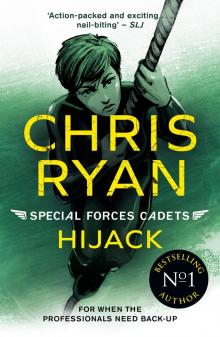 Hijack
Hijack Special Forces Cadets 2
Special Forces Cadets 2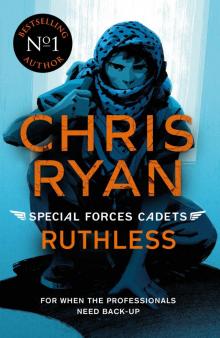 Ruthless
Ruthless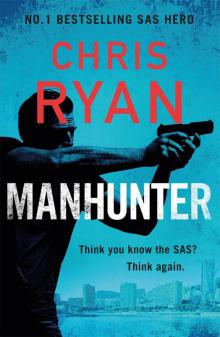 Manhunter
Manhunter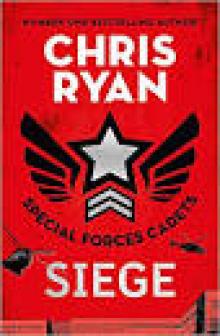 Special Forces Cadets 1
Special Forces Cadets 1 Red Strike
Red Strike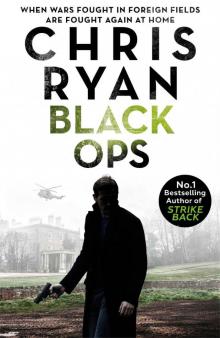 Black Ops
Black Ops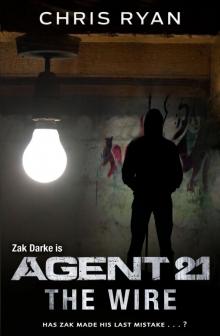 Agent 21: The Wire
Agent 21: The Wire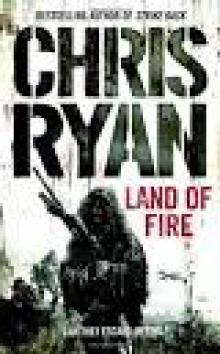 Land of Fire
Land of Fire Alpha Force: Fault Line
Alpha Force: Fault Line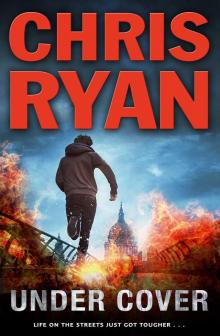 Under Cover (Agent 21)
Under Cover (Agent 21)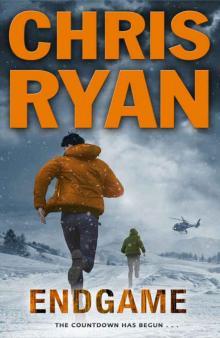 Endgame (Agent 21)
Endgame (Agent 21) Red Centre
Red Centre Blackout
Blackout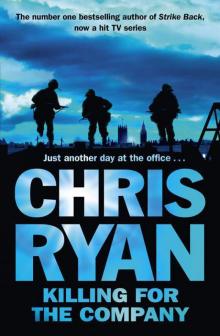 Killing for the Company
Killing for the Company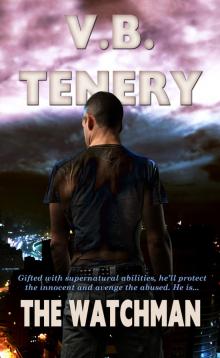 The Watchman
The Watchman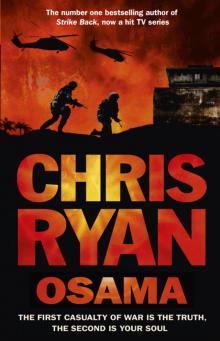 Osama
Osama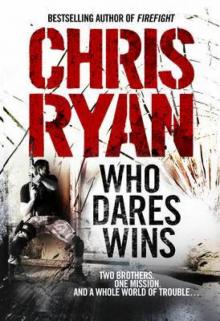 Who Dares Wins
Who Dares Wins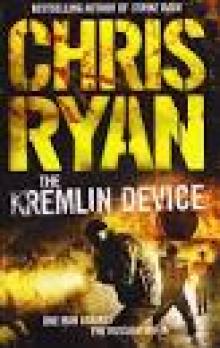 The Kremlin Device
The Kremlin Device Hunter Killer
Hunter Killer Alpha Force: Untouchable
Alpha Force: Untouchable Stand By Stand By
Stand By Stand By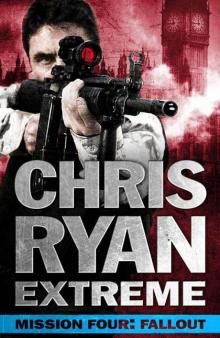 Chris Ryan Extreme: Hard Target: Mission Four: Fallout
Chris Ryan Extreme: Hard Target: Mission Four: Fallout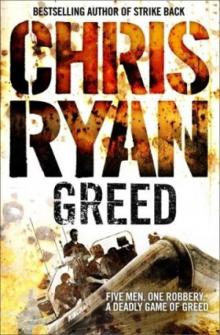 Greed mb-1
Greed mb-1 Alpha Force: Desert Pursuit
Alpha Force: Desert Pursuit Strike Back
Strike Back Greed
Greed The Bay Bulls Standoff
The Bay Bulls Standoff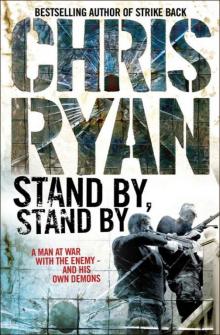 Stand By, Stand By gs-1
Stand By, Stand By gs-1 Outbreak
Outbreak Hunted
Hunted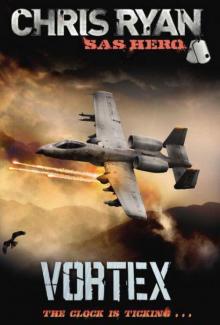 Vortex cr-4
Vortex cr-4 Rat-Catcher
Rat-Catcher Vortex
Vortex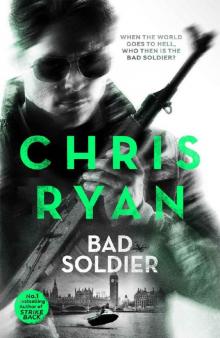 Bad Soldier
Bad Soldier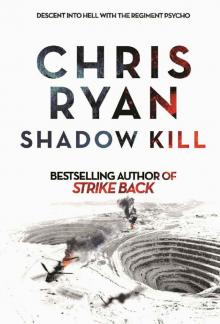 Shadow Kill: A Strikeback Novel
Shadow Kill: A Strikeback Novel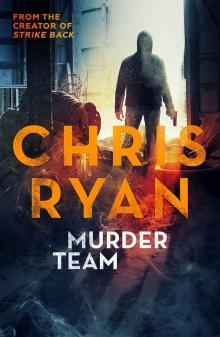 Murder Team (Kindle Single)
Murder Team (Kindle Single) One Good Turn
One Good Turn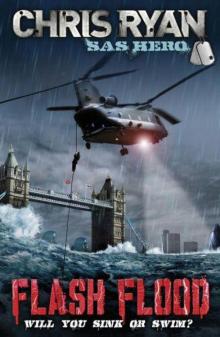 Flash Flood cr-1
Flash Flood cr-1 Night Strike
Night Strike Wildfire
Wildfire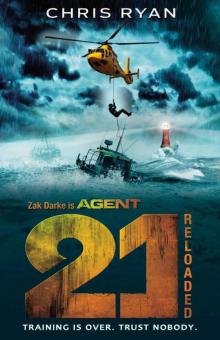 Agent 21: Reloaded: Book 2
Agent 21: Reloaded: Book 2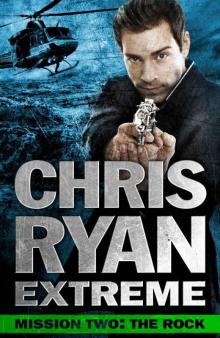 Chris Ryan Extreme: Hard Target: Mission Two: The Rock
Chris Ryan Extreme: Hard Target: Mission Two: The Rock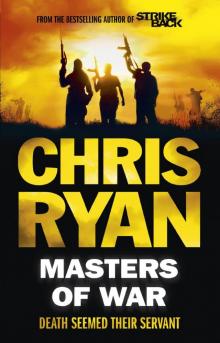 Masters of War
Masters of War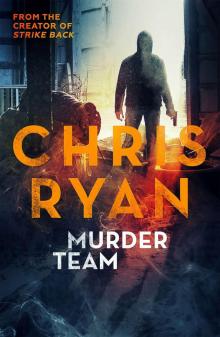 Murder Team
Murder Team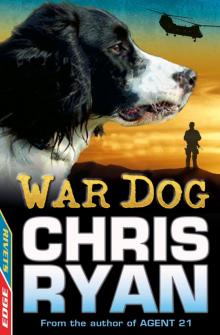 War Dog
War Dog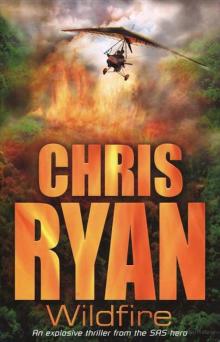 Wildfire cr-2
Wildfire cr-2 Survival
Survival The One That Got Away - Junior edition
The One That Got Away - Junior edition The Hit List
The Hit List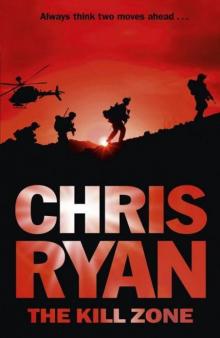 The Kill Zone
The Kill Zone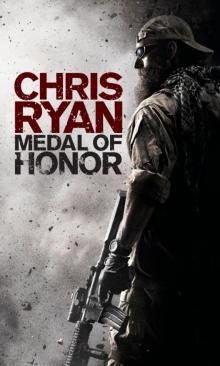 Medal of Honor
Medal of Honor Battleground
Battleground Twister
Twister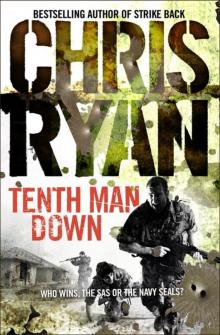 Tenth Man Down gs-4
Tenth Man Down gs-4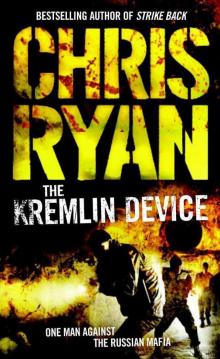 The Kremlin Device gs-3
The Kremlin Device gs-3 Hostage
Hostage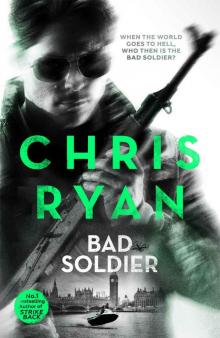 Bad Soldier: Danny Black Thriller 4
Bad Soldier: Danny Black Thriller 4 Alpha Force: Blood Money
Alpha Force: Blood Money Firefight
Firefight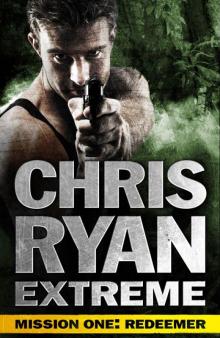 Chris Ryan Extreme: Hard Target: Mission One: Redeemer
Chris Ryan Extreme: Hard Target: Mission One: Redeemer Hit List
Hit List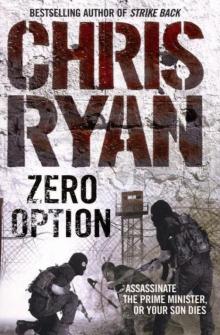 Zero Option gs-2
Zero Option gs-2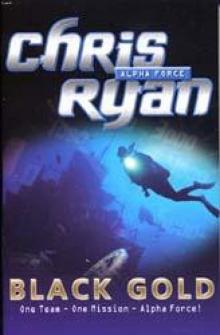 Black Gold
Black Gold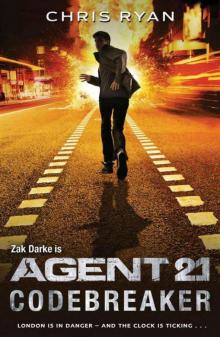 Agent 21: Codebreaker: Book 3
Agent 21: Codebreaker: Book 3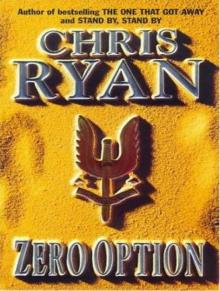 Zero Option
Zero Option Ultimate Weapon
Ultimate Weapon Tenth Man Down
Tenth Man Down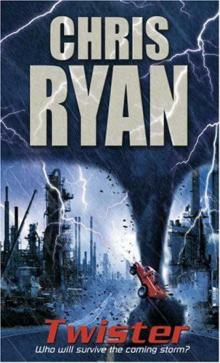 Twister cr-5
Twister cr-5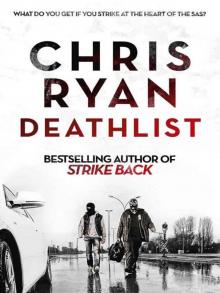 Deathlist
Deathlist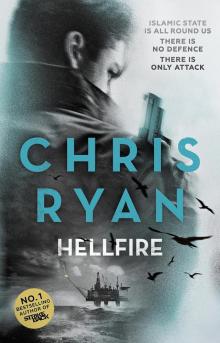 Hellfire
Hellfire Flash Flood
Flash Flood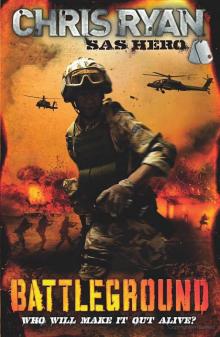 Battleground cr-6
Battleground cr-6 The Increment
The Increment